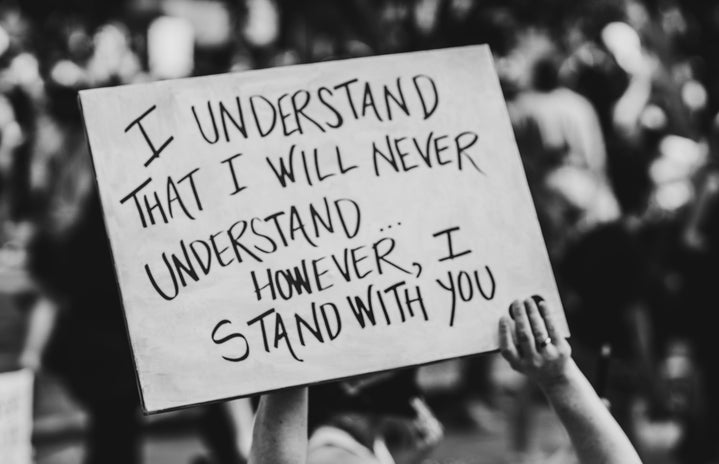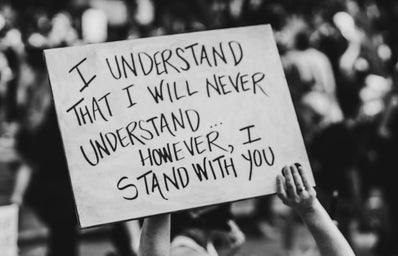There is no easy way to do this. I wish there were. I wish I could be your fairy godmother, descending from the heavens in a gorgeous gown, waving my magic wand and giving you all the answers. But unfortunately all I have is my brain, my knowledge and this keyboard.
There is no easy way to be an ally. No rule book or check list. It’s a process of trial and error. A process, quite frankly, I am still learning. But you’ve taken the first step. You’ve asked the question and you’ve begun to seek the answers. So maybe this will help. I present to you: Allyship Baby Steps. You gotta start somewhere.
Ally: What is it? Why is it important?
So, what is an ally? An ally is a person who owns and recognizes their privilege within society and uses it to advocate for people in marginalized communities. For example, an ally might be a white student who defends and supports a black student when they face discrimination in the classroom.
Allies are essential to social change and activism. They can use their power and privilege to bring attention to marginalized groups and help strengthen voices. They can also create links of empathy between marginalized groups and privileged groups. While it is not the ally’s job to speak for the marginalized groups (something important to keep in mind as you begin your journey), they can be the microphone that amplifies a message and spreads it to more communities.
Education, education, education. Did I mention education?
The first step is to ask the question: “What can I do to be a better ally?” Congratulations! You can tick that off your list. Now comes the next step: educating yourself.
If you’ve been paying any attention to the news recently, you’ll have noticed the distressing headlines. Fights for gender equality, racial justice, fair immigration policies and health care dominate our feeds, papers, and TV screens. To say the least, it can be overwhelming. You’ll hear activists like myself urge you to educate yourself, but with so many issues to choose from, where do you start?
My suggestion? Start with what inspired you to be a better ally. What called you to action? What gave you this passion and desire for change? What made you realize you could no longer be complacent? If you’re not sure, sit with it. What do you find yourself going back to? Do you find yourself reading up on acts of police brutality against our communities of color? Or are you moved by calls by our trans communities to be allowed to live their lives, free of harassment and discrimination? What moves you? Start there.
You don’t have to take on the entire world at once. Start at the starting line. Trust me, the rest of the knowledge will come. These issues of equality, injustice and equity are more interconnected than you think. Starting by learning about xenophobia will later present information about sexism and racism. So start with one issue, you’ll learn about the rest.
Once you have your issue, Google (or I should say, Google responsibly). Organizations sponsoring your issues have great educational resources. Colleges hold seminars and talks you can attend. Follow activists on social media – oftentimes they have excellent resources you can use! Read books written by well-known authors actively working to resolve the issue you’ve chosen to focus on. Watch documentaries. Volunteer. Get your news from MULTIPLE sources. Don’t just stick with CNN or Fox News. If you’re going to be informed, you must be informed from all angles.
Listen and own your privilege.
This, in my opinion, is the hardest step in becoming a true ally.
You’ve probably heard the term privilege before, but what exactly is it? To put it in its simplest terms, privilege is defined as any advantage you have over others. These privileges can be given to you because of the color of your skin, your assigned and expressed gender, your sexuality, your social and economic status, your education level or even what language you speak. To become a true ally, you must recognize that you have this privilege. And that, whether consciously or unconsciously, it has given you an advantage and has contributed to the problem.
Acknowledging privilege is not an easy task. Trust me, I speak from experience. My freshman year of college I took an Ethnic Studies class where we discussed the impact of colonialism on the Native Americans in the United States. I consider myself to be a very aware and open minded person. Yet, I still struggled. I felt guilty and was deeply disturbed by the horrors my ancestors had inflicted on these communities. For a long time, I refused that I had been and was continuing to contribute to this problem. I consistently found myself wanting to object – to use the phrase “yes, but not all white people. Not me.” It took me a very long time to acknowledge that “yes, me.” My ancestors built homes on this land. They sent their children to schools built on native land. They built factories and shops. They were complacent in the genocide and I am here because of that. I am still benefiting from their ruthlessness. So, yes me. I may not have directly contributed to the attempted genocide of our countries original inhabitants, but I benefit from their suffering today whilst simultaneously doing very little to bring about justice, and therefore have indirectly added to the problem.
To be an ally is to have this struggle within yourself; to feel that guilt and horror and to acknowledge its existence and its fault. It is not easy. I still struggle with it. But it is an ESSENTIAL step.
And then, listen. As human beings, we have an innate urge and tendency to want to defend ourselves. So when we are accused of something like societal racism or sexism – when we are told that we are part of the problem – our instinct is to point out how we are NOT part of the problem. I am guilty of this, so I know how difficult it can be to stop. To hold back and listen. To not justify your innocence, but to try and understand how your existence has affected another person. Yes, you as a white person, may not be an outright racist. But you have been given privilege because of your whiteness. So when a person of color explains to you HOW you’ve been given this privilege and how it affects their community, understand they are not saying YOU are a horrible person. They are saying our system has given you a privilege that has harmed them. Try and understand. Learn from their words. Reflect, don’t deflect. If you are able to explore and understand what they are saying rather than block it out, I guarantee you will learn about how to best support them. Which really is what allyship is all about.
Just try! And be open to feedback.
You’re not going to always know the right terminology or the right thing to say. That’s okay! Try the best you can. Start with what you know. If it makes you more comfortable, voice that you’re not sure if what you’re saying is correct but that you wanted to try. You can’t have the conversations allies need to have if you don’t try.
And then: be open to the feedback you receive! If your terminology has to be adjusted or someone corrects your thinking, apologize and move forward. Congrats! You have now added another nugget of knowledge to your tool box.
The best way to learn is to move forward. We cannot improve without mistakes. Be patient. This takes time and that’s okay. It does not matter how slow you go as long as you do not stop.
Do the work! And remember to be the Amplifier, not the Amplified.
It’s not enough to say you’re an ally. You gotta do the work too. What does that mean?
- Keep yourself educated on the causes that matter to you. What’s going on in the news? What are activists saying?
- Volunteer. Are there women’s resource centers you can support? What about a teen homeless shelter? Volunteering is a great way to give back and learn about the issues you’re working to address.
- Watch out for discrimination in your everyday life. Is a coworker being targeted because of their ethnicity? Is your professor using harmful and outdated language to address transgender students? Is someone being verbally harassed on the street because of their gender expression? Note it and act. Below are two videos to give you some tools and strategies on how to intervene!
- Keep trying. Being an ally can be tiring, but don’t give up. Your work and support is important and will bring about much needed change!
And finally, remember: it is not your job to speak for these marginalized communities, but rather to help spread the word. Don’t speak or act for them, listen to them and support how they ask you to support them. Don’t do the work for them, help them do the work in the way you are asked. They have lived these acts of discrimination; they know best how to address them. Amplify their voices, don’t overpower them.
If you’re still looking for information, check out the video below for an excellent summary of what you’ve just read!
Ready?
You got this. Remember, these are beginning steps and you’re going to mess up. That’s okay! None of us do this perfect right off the bat. You’ve taken the first few steps and you’ll take many more.
Learn. Listen. Act. And grow. You’re on your way, good luck!


